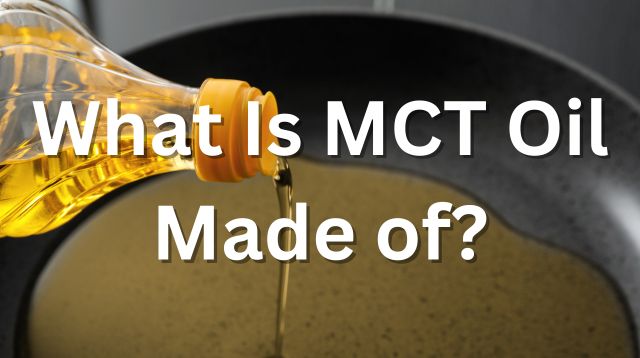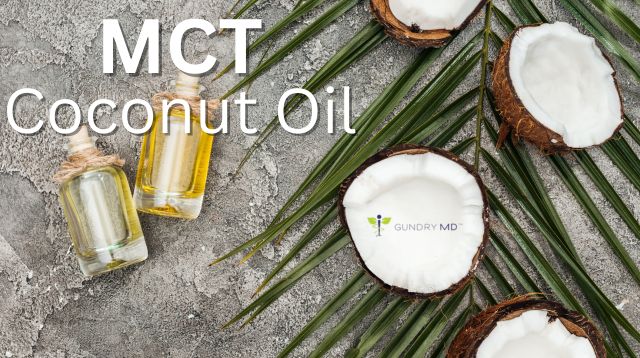The Benefits of MCT Oil: Nutrition Facts

What Is MCT Oil?
MCT oil is a supplement derived from the MCT fatty acids (medium-chain triglycerides) found predominantly in coconut oil. It is more concentrated than coconut oil and contains only the most potent MCTs. MCTs have smaller molecules than most oils and are quickly absorbed into the bloodstream.1
MCT oil has shown an array of potential health benefits, so incorporating MCT oil into a balanced diet may provide nutritional benefits, as we’ll take a look at below.

What Is The Difference Between MCT Oil And Coconut Oil?
MCT oil and coconut oil differ significantly in terms of their composition and potential health benefits. As MCT oil is concentrated from coconut oil, it contains 100% MCTs, while coconut oil contains only around 50% MCTs.2
Coconut oil contains all four MCTs: caprylic acid (C8), capric acid (C10), lauric acid (C12), and caproic acid (C6), but it is largely made up of lauric acid. Lauric acid acts more like an LCT (long-chain triglyceride) and is generally considered to be an unhealthy saturated fat.3,4
MCT oil typically consists of a blend of caprylic acid and capric acid, the most potent, healthy compounds.5
What Are The Potential Nutritional Benefits Of MCT Oil?
Here are some of the most promising nutritional benefits of MCT oil being studied:
- Help With Weight Management: Research suggests that consuming MCT oil may lead to greater energy expenditure, and therefore be useful in weight management. It also has a high burn rate, which can boost the number of calories burned after meals, known as post-meal thermogenesis.6
- Support Energy and Focus: MCT oil may be beneficial as a fast source of energy because it’s so quickly absorbed into the bloodstream. MCTs are also converted into ketones in the liver, so they may provide better, more efficient brain energy, potentially promoting focus and concentration.7,8
- Assist Healthy Blood Sugar Levels: One of the benefits of MCT oil is that it may help to keep blood sugar at safe, healthy levels. This could have a big impact on how people keep their blood sugar levels in check.9
- Boost Brain Function: MCT oil stimulates the production of ketones, a highly efficient energy source for the brain. These ketones have shown a promising ability to support brain function. MCT oil has also shown potential neuroprotective properties, which might help to protect the brain.10-12

How Does MCT Oil Compare To Other Oils?
MCT Oil is extracted from coconut oil and contains different proportions of MCTs compared to coconut oil. Let’s take a look at the nutritional properties of MCT Oil in comparison to other commonly used oils.
MCT Oil:
- MCT oil contains quick-absorbing MCTs, typically a blend of caprylic acid (C8) and capric acid (C10).
- The other two MCTs found in basic coconut oil – lauric acid (C12) and caproic acid (C6) – are usually removed, or used in small quantities, to enhance the quality and effectiveness of MCT oil.13
Coconut Oil:
- Coconut oil contains all 4 MCTs, plus a small amount of LCTs (long-chain triglycerides).
- It’s about 47% lauric acid (C12) with smaller amounts of C6, C8, and C10.
- It contains trace amounts of monounsaturated and polyunsaturated fats.
- Although it’s technically an MCT, lauric acid behaves like an LCT in terms of digestion, so coconut oil does not have the same potential benefits as MCT oil.14
Olive Oil:
- Olive oil is high in oleic acid (55-83%), a monounsaturated fat.
- It’s rich in antioxidants and polyphenols.
- It contains vitamin E (a fat-soluble antioxidant) and other beneficial compounds, like squalene (a hydrating lipid used in skincare).15
Avocado Oil:
- Avocado oil contains monounsaturated fats, primarily oleic acid.
- It’s high in antioxidants, like the carotenoids lutein and zeaxanthin.
- It contains beneficial vitamins and minerals, such as vitamins C, E, and K, B vitamins, potassium, folate, and magnesium.16
Flaxseed Oil:
- Flaxseed oil is rich in omega-3 fatty acids, specifically alpha-linolenic acid (ALA).
- It also contains linoleic acid (LA), an omega-6 fatty acid, and oleic acid, an omega-9 fatty acid.
- It contains lignans, which have antioxidant properties.
- It’s best consumed in cold-pressed form to preserve its nutritional properties.17
As you can see, each of these oils serves its own healthy purpose and can be helpful to your body in different ways.

What Foods Contain MCT Oil?
MCT oil is usually derived from coconut oil or palm kernel oil, but can also be found in smaller amounts in food, like:
- Butter (especially from grass-fed cows)
- Whole milk, goats milk
- Cheese (such as cheddar and gouda)
- Yogurt (full-fat yogurt)18
MCTs can also be found in high concentrations in breast milk, making it a natural component of infant nutrition.19
In addition to incorporating these foods into a healthy diet, an MCT oil supplement can be useful to provide more sustainable amounts of MCTs. However, it is essential to choose a high-quality MCT product (liquid or powder form) from a reputable brand. Also, it’s always a good idea to consult with your healthcare provider before starting any new supplement.
How Can You Use MCT Oil?
MCT oil is used as a dietary supplement and can be added to food or drink in a multitude of ways. For example, it can be added to hot beverages, like tea or coffee, blended into smoothies, or used in baking. It can also be mixed into salad dressings or used as a substitute for other oils in recipes.
Though popularly known as MCT oil, you can also buy MCT powder, which is often easier to use as a supplement. MCT powder may come with extra potential health benefits depending on the additional ingredients used in its formulation.20 It’s important to choose a high-quality MCT powder to ensure maximum benefits.
MCT Oil Fast Nutrition Facts
Finally, let’s take a look at some key nutrition facts about MCT oil:21,22
Macronutrient Composition:
- Calories: One tablespoon of MCT oil contains approximately 120 calories.
- Fat: MCT oil is primarily composed of fat, with around 14 grams per tablespoon.
- Carbohydrates: MCT oil does not contain any carbs.
- Protein: MCT oil does not contain any protein.
Types of Fats:
- Saturated Fat: MCT oil is high in saturated fat, with between 11-14 grams per tablespoon.
- *However, it's important to note that these are medium-chain saturated fats, which behave differently in the body compared to long-chain saturated fats.23
- Mono and Polyunsaturated Fats: MCT oil contains small amounts – just 1g per tablespoon.
- Trans Fat: MCT oil does not contain any trans fats.
Vitamins and Minerals:
- MCT oil does not contain any significant vitamins and minerals.
When it comes to nutrition, MCT oil offers a distinct nutritional profile characterized by those rich medium-chain triglycerides – caprylic acid and capric acid. With its potential health benefits and ease of use, products containing MCT oil are a popular choice for those seeking an easy and beneficial addition to a healthy diet.
Sources
- https://www.health.harvard.edu/blog/is-there-a-place-for-coconut-oil-in-a-healthy-diet-2019011415764
- https://www.ncbi.nlm.nih.gov/pmc/articles/PMC4882694/
- https://www.acs.org/molecule-of-the-week/archive/l/lauric-acid-myristic-acid.html
- https://www.healthline.com/nutrition/mct-oil-vs-coconut-oil#mc-ts
- https://pubmed.ncbi.nlm.nih.gov/2021124/
- https://www.sciencedirect.com/science/article/abs/pii/S0031938420305667
- https://www.ncbi.nlm.nih.gov/pmc/articles/PMC4669977/
- https://pubmed.ncbi.nlm.nih.gov/1568535/
- https://alz-journals.onlinelibrary.wiley.com/doi/abs/10.1002/alz.055702
- https://pubmed.ncbi.nlm.nih.gov/33220329/
- https://www.frontiersin.org/articles/10.3389/fneur.2023.1123290/full
- https://www.healthline.com/nutrition/mct-oil-101#mct-oil
- https://www.hsph.harvard.edu/nutritionsource/food-features/coconut-oil/
- https://www.ncbi.nlm.nih.gov/pmc/articles/PMC6770508/
- https://www.hsph.harvard.edu/nutritionsource/avocados/
- https://www.verywellhealth.com/flaxseed-oil-health-benefits-how-to-use-and-cautions-4178046
- https://www.sciencedirect.com/science/article/abs/pii/S104366180900276X?via%3Dihub
- https://www.frontiersin.org/articles/10.3389/fnut.2022.804880/full
- https://aapharmachem.com/mct-oil-and-oil-powder/
- https://www.nestlehealthscience.ca/en/brands/mct-oil/mct-oil
- https://www.nutritionix.com/food/mct-oil
- https://pubmed.ncbi.nlm.nih.gov/26727347/
Related posts


